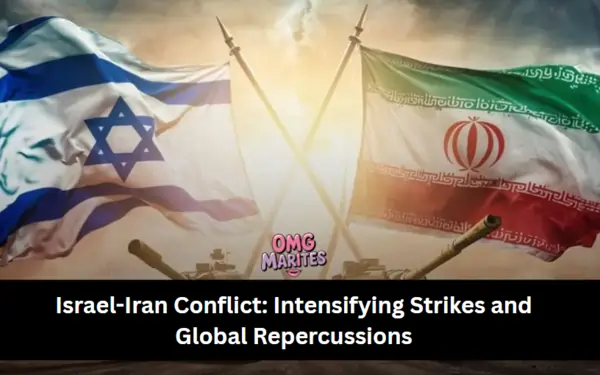The Israel-Iran conflict in 2025 has erupted into unprecedented violence, with both nations launching missile strikes at each other and causing significant civilian casualties.
The international community watches in horror as this long-standing dispute takes a dangerous turn. U.S. President Donald Trump has stated that the conflict could be resolved quickly, but his warning to Iran not to target any U.S. interests suggests a deepening global crisis.

Israel’s Response: Destruction and Death in the Streets
Israeli forces have intensified their attacks on Iran, targeting key military installations, as well as nuclear and energy sites. As of the latest reports, at least 10 Israelis have been killed in the latest missile strikes, including several children.
Emergency response teams have been working around the clock, sifting through the rubble of destroyed homes in Jerusalem, Haifa, and Tel Aviv. Despite the devastation, Israeli Prime Minister Benjamin Netanyahu has declared that the attacks will not ease but intensify.
Iran’s Retaliation: Missiles and Civilian Losses
In response, Iran has retaliated with heavy missile fire, resulting in the deaths of at least 138 people, including more than 60 children. A devastating missile strike in Tehran destroyed a 14-story apartment block, further fueling the violence.
Iranian officials argue that they are acting in self-defense, accusing Israel of sabotage aimed at destabilizing nuclear talks that were due to resume in Oman. The situation is dire, with civilians trapped in the middle of an escalating conflict.
Trump’s Intervention: A Deal in the Works?
While Trump has expressed support for Israel’s offensive, he has also warned that Iran should not provoke the U.S. in any way. His statements underscore the risk of U.S. military intervention if Iran attacks American interests.
Despite the looming threat, Trump suggested that a diplomatic solution could still be possible, though no concrete details have emerged regarding a peace agreement between Israel and Iran.
Nuclear Tensions: Diplomatic Challenges in the Wake of Strikes
The ongoing violence has complicated the already fragile negotiations concerning Iran’s nuclear program. The International Atomic Energy Agency (IAEA) has accused Iran of violating its obligations under the Non-Proliferation Treaty (NPT), citing concerns over Iran’s advancing nuclear capabilities.
Israel, which is widely believed to have nuclear weapons, remains determined to prevent Iran from obtaining nuclear weapons, leading to the increased military actions that are now threatening to destabilize the region.
Economic Impact: A Surge in Oil Prices and Market Volatility
As the conflict intensifies, fears about disruptions in Middle Eastern oil exports have caused a surge in oil prices, rising by nearly 9%. Both Israel’s airstrikes and Iran’s missile retaliation have targeted key energy infrastructure, with Iran’s South Pars gas field reported as one of the key sites affected. Global oil markets are on edge, with the risk of sustained price hikes.
Global Response: Proxy Forces and Regional Power Struggles
The regional consequences of the Israel-Iran conflict have already started to ripple across the Middle East. The Houthi rebels in Yemen, a key ally of Iran, have launched missiles at Tel Aviv, escalating the regional nature of the conflict.
Israel’s military has targeted Houthi military leaders in response, signaling the growing complexity of the situation. Additionally, Iran’s regional proxies, including groups in Gaza and Lebanon, have seen their influence diminished in recent years, leaving Iran with fewer options for retaliation.
Looking Ahead: What’s Next for Israel and Iran?
As the military conflict rages on, there are growing concerns about the potential for a broader regional war involving multiple nations.
Netanyahu has urged Iranian citizens to rise up against their government, signaling that Israel’s goals may extend beyond mere military strikes to regime change. Meanwhile, the international community is calling for a ceasefire and renewed diplomatic talks, but the possibility of a lasting peace remains uncertain.
References:
- Reuters – Israel and Iran bombard each other as Trump says conflict can easily end
- International Atomic Energy Agency (IAEA) – Iran’s Nuclear Non-Proliferation Treaty (NPT) Obligations
- United Nations – Nuclear Non-Proliferation Treaty
- The New York Times – Trump warns Iran of ‘full strength’ retaliation
- BBC – Iran’s nuclear ambitions and the global response

Maria Theresa Mondragon, better known online as Antie Marites, is a 33-year-old Filipina content creator who’s turning “chismis” into credible news and meaningful conversation.
With a knack for storytelling and a passion for public service updates, Antie Marites creates relatable, informative, and bite-sized news content for the digital Pinoy. Whether it’s trending headlines, government announcements, or everyday life in the Philippines, she breaks it down in a way that’s clear, fun, and easy to understand—no filter, no fake news.
She’s the tita who sips her kape while scrolling DBM updates and turns it into your next viral TikTok.She’s also your go-to source for “real talk sa real-time news.”
Follow her journey and daily chika on:
📲 Facebook: OMGMarites
📱 TikTok: @omgmarites2025
